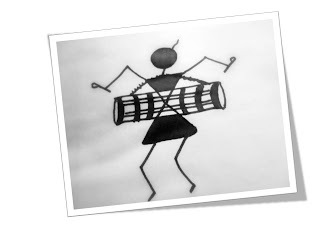Monday, August 29, 2011
Saturday, August 27, 2011
Friday, August 26, 2011
Thursday, August 25, 2011
Wednesday, August 24, 2011
Tuesday, August 23, 2011
Monday, August 22, 2011
Sunday, August 21, 2011
Saturday, August 20, 2011
Friday, August 19, 2011
Thursday, August 18, 2011
Wednesday, August 17, 2011
Tuesday, August 16, 2011
Monday, August 15, 2011
How to draw a warli man/woman?
1. Draw a circle which represents the head of warli man/woman.
2. Draw a very short line extending from the circle which
represents the neck of the warli man/woman.
3. Draw an upside triangle at the base of neck which represents
the upper body of the warli man/woman.
4. Draw an upright triangle attached to the head of the first
triangle which represents the lower body of the warli man/ woman.
5. Draw two legs starting from the base of the
lower triangle.
6. Draw two hands from the base of the upper triangle.
7. Draw a curved line from the head to complete the warli man.
8. Draw a bun from the head and a couple of lines attached to the
bun to complete the warli woman.
9. Fill the geometrical figures to beautify the warli man/woman.
Warli art
Warli art is one of the oldest traditional art of india.
Their extremely rudimentary wall paintings use a very basic graphic vocabulary: a circle, a triangle and a square. The circle and triangle come from their observation of nature, the circle representing the sun and the moon, the triangle derived from mountains and pointed trees. Only the square seems to obey a different logic and seems to be a human invention, indicating a sacred enclosure or a piece of land.
The ritual paintings are usually done inside the huts. The walls are made of a mixture of branches, earth and cow dung, making a red ochre background for the wall paintings. The Warli use only white for their paintings. Their white pigment is a mixture of rice paste and water with gum as a binding. They use a bamboo stick chewed at the end to make it as supple as a paintbrush. The wall paintings are done only for special occasions such as weddings or harvests.
Through this blog lets explore the warli art.
Subscribe to:
Comments (Atom)
























